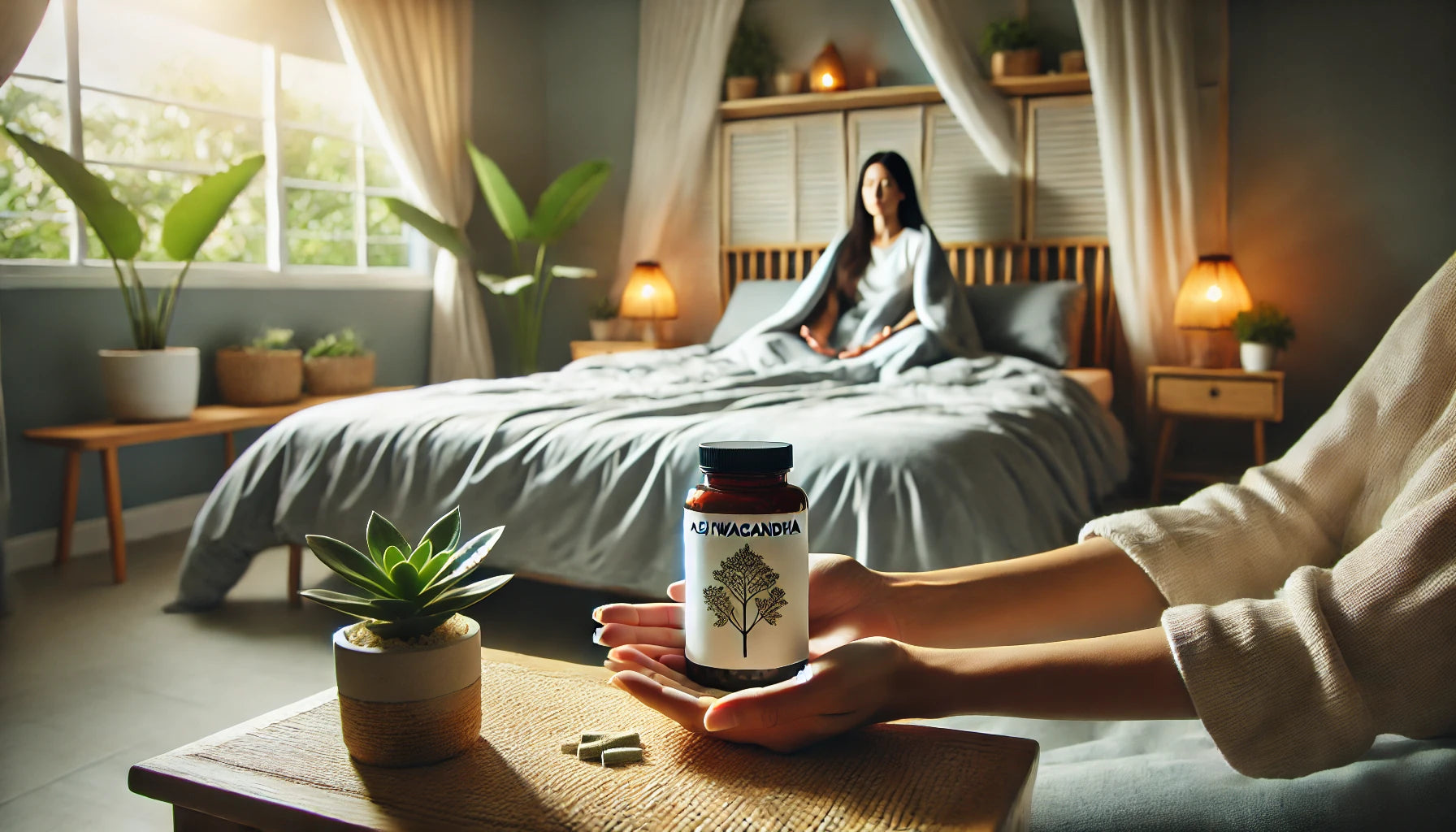Is Ashwagandha Safe? (What You Need to Know in 2024)

Ashwagandha, or Withania somnifera or Indian ginseng, is a powerful adaptogenic herb used for centuries in traditional medicine.
This article explores whether it is safe and what its potential health benefits are.
Is Ashwagandha Safe?
Ashwagandha is safe for most individuals when taken at recommended dosages.
A clinical trial evaluating its safety and efficacy found minimal side effects. However, some people may experience mild digestive discomfort.
Being aware of potential interactions with medications and other supplements is crucial.
How to Take Ashwagandha Safely
For safe use of Ashwagandha:
Dosage Recommendations: Common dosages range from 300 to 600 mg of Ashwagandha root extract daily.
Forms: Ashwagandha can be taken as a dietary supplement in capsules, powders, or extracts.
Consulting Healthcare Providers: This is especially important for those with pre-existing health conditions or those taking other medications.
 Special Considerations
Special Considerations
- Pregnant and Breastfeeding Women should avoid Ashwagandha due to potential risks.
- Those with thyroid disorders or autoimmune diseases should consult a healthcare provider before using Ashwagandha
Health Benefits of Ashwagandha
The benefits of Ashwagandha include:
- Reduce Stress and Anxiety: A systematic review and meta-analysis found that Ashwagandha significantly reduces cortisol, the stress hormone, thereby helping manage stress and anxiety.
- Improve Sleep: Ashwagandha may improve sleep quality and duration, enhancing overall restfulness.
-
Support for Cancer Patients: Ashwagandha is being studied for its potential benefits in supporting cancer patients, particularly in reducing stress and improving life quality.
Insights into Ashwagandha's Adaptogenic Properties
Ashwagandha is celebrated for its adaptogenic properties, meaning it helps the body adapt to stress.
This herb modulates the body's stress response, reduces cortisol levels, and promotes a sense of calm and balance.
Regular use can lead to improved resilience against physical and mental stressors.

Ashwagandha in Modern Medicine
Modern research continues to explore the potential benefits of Ashwagandha.
Studies suggest that Ashwagandha might have neuroprotective properties, support cognitive function, and enhance athletic performance.
These findings highlight Ashwagandha's role in both traditional and contemporary health practices.
Final Thoughts
Ashwagandha is a beneficial herb for reducing stress, improving sleep, and supporting overall well-being. When taken correctly, it is safe for most people.
Consult with a healthcare provider before starting Ashwagandha supplements.
Experience the benefits of Ashwagandha with Wild Foods' Wild Man Natural Testosterone Complex.
Enhance your health naturally by visiting Wild Foods.
By incorporating Ashwagandha into your daily routine, you can harness its powerful effects on stress, sleep, and overall health.
Always follow recommended dosages and consult a healthcare professional for personalized advice.
FAQs
Is it safe to use Ashwagandha daily?
Generally, ashwagandha is safe to use daily for most healthy adults. However, it's essential to consult with a healthcare provider before starting any new supplement regimen, especially if you have health conditions that might be affected by using ashwagandha.
Can ashwagandha help reduce stress and anxiety?
Yes, studies suggest that ashwagandha can help reduce stress and anxiety. The impact of ashwagandha on stress has been well-documented, showing that it can help improve overall mental well-being.
Are there any adverse effects of ashwagandha?
While ashwagandha is generally considered safe, some people might experience adverse effects such as stomach upset, diarrhea, or allergic reactions. It's crucial to start with a lower dose and consult a healthcare provider if you experience any adverse symptoms.
How does ashwagandha affect thyroid hormone levels?
Ashwagandha may influence thyroid hormone levels. Some studies have shown that it can help to normalize thyroid function, making it a potential supplement for those dealing with thyroid imbalances. However, always consult your doctor before using ashwagandha if you have thyroid-related issues.
What does research say about the efficacy and safety of ashwagandha?
Research generally supports the efficacy and safety of ashwagandha, particularly in reducing stress and improving sleep. Yet, more studies are needed to ascertain long-term effects. The Food and Drug Administration does not regulate supplements like medications, so consulting a healthcare provider is advised.
Can ashwagandha increase testosterone levels in men?
Some studies have indicated that ashwagandha may increase testosterone levels in men, which can potentially improve reproductive health. However, more research is needed to understand the effects of ashwagandha on hormone levels fully.
Is it safe for cancer patients to use ashwagandha?
The use of ashwagandha in cancer patients, especially those with hormone-sensitive prostate cancer, should be approached with caution. There's some evidence that the extract of ashwagandha could interact with specific cancer treatments, so it's crucial to consult with an oncologist before use.
Can ashwagandha improve sleep quality?
Yes, ashwagandha extract has shown promise for sleep quality. Studies indicate that it can help improve sleep patterns. This is attributed to its ability to reduce stress and anxiety, which often interfere with good sleep.
How much ashwagandha should one take per day?
The appropriate daily dosage of ashwagandha can vary depending on the form and the individual's health status. Generally, doses range from 250 mg to 600 mg. It's best to start with a lower dose and adjust as needed under the guidance of a healthcare provider.
What kind of health conditions should be avoided when using ashwagandha?
People with autoimmune diseases, hormone-sensitive health conditions such as hormone-sensitive prostate cancer, or those scheduled for surgery should avoid using ashwagandha unless advised otherwise by their healthcare provider. Pregnant and nursing women should also consult with their doctors before use.

